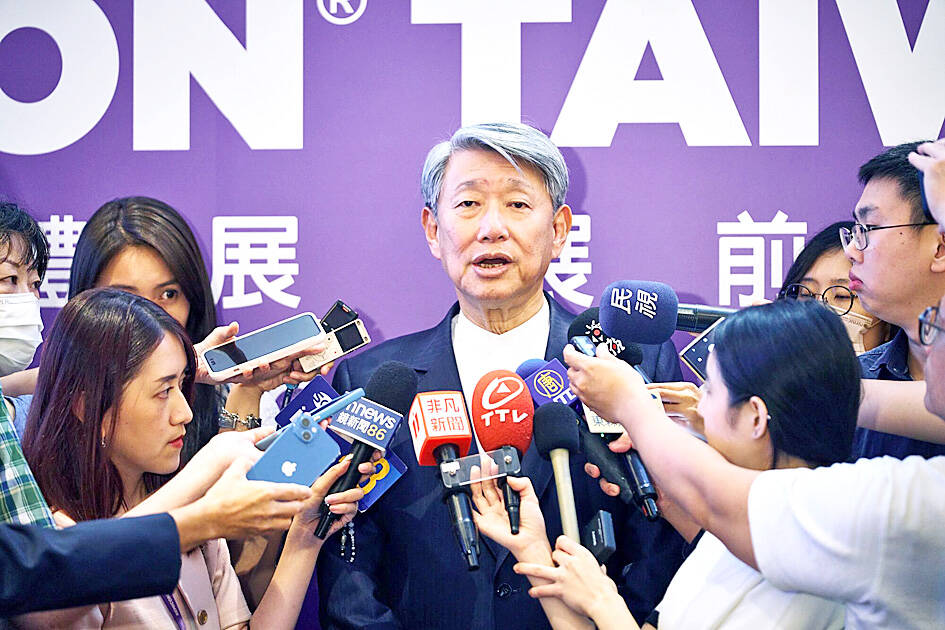Minister of Economic Affairs J.W. Kuo (郭智輝) yesterday said Taiwan’s government plans to set up a business service company in Kyushu, Japan, to help Taiwanese companies operating there.
“The company will follow the one-stop service model similar to the science parks we have in Taiwan,” Kuo said. “As each prefecture is providing different conditions, we will establish a new company providing services and helping Taiwanese companies swiftly settle in Japan.”
Kuo did not specify the exact location of the planned company but said it would not be in Kumamoto, the Kyushu prefecture in which Taiwan Semiconductor Manufacturing Company (TSMC, 台積電) has a fab and is preparing to build another one.

Photo: An Rong Xu, Bloomberg
Different prefectures in Kyushu are offering different incentives for foreign companies, "so the service company we set up will help organize the information and facilitate the 'localization' of Taiwanese enterprises," Kuo said.
Nagasaki, Oita, Miyazaki, and Kitakyushu are some of the Kyushu prefectures that have expressed interest in welcoming Taiwanese companies, he said.
Currently, the plan is limited to Kyushu, he said in response to a question on whether other Taiwanese one-stop service centers will be set up in Japan in the future.
Photo: Grace Hung, Taipei Times
"For other areas such as Kansai and Kanto, it would depend on the nature of the local industries, as most of the Taiwanese companies currently in Japan are part of the supply chain [for the semiconductor industry]," Kuo said.
Asked about a report that TSMC was planning to build a third fab in Japan, Kuo said that question should be directed to the company.
A Japanese media outlet on Sunday quoted Kuo as saying that TSMC would build a third fab in Japan to produce leading-edge chips after 2030.
Kuo, who was doorstepped by reporters ahead of a news conference for this week’s Semicon Taiwan exhibition, also pushed back at criticism of Taiwan by US Republican presidential nominee and former president Donald Trump, and denied that Taiwan took the US chip industry.
“Of course Taiwan is not stealing the chip industry from the US,” Kuo told reporters in Taipei. “The chips we made are commissioned by US companies, which still have the highest gross margin. Trump might have some misunderstanding on such matters, and we will clarify that.”
Trump rattled Taiwan officials and the country’s markets with comments published on July 16 in Bloomberg Businessweek that criticized Taiwan over its chip sector and urged it to pay the US for protection.
That has raised fears that if Trump succeeds US President Joe Biden, who has repeatedly said the US would defend Taiwan from a Chinese attack, he would be less committed, viewing Taiwan in transactional terms.
“Taiwan took our chip business from us,” Trump said at the time. “I mean, how stupid are we? They took all of our chip business. They’re immensely wealthy.”
Since Trump’s comments, Taiwanese officials have tried to talk up the nation’s efforts to uphold its part of the relationship.
In response to Trump’s call for Taiwan to “pay” the US for protection, Premier Cho Jung-tai (卓榮泰) said the country has increased defense spending and extended the conscription period.
“It’s our shared responsibility and goal to maintain the peace and stability in the Taiwan Strait and the Indo-Pacific region,” Cho said on July 17.

The Eurovision Song Contest has seen a surge in punter interest at the bookmakers, becoming a major betting event, experts said ahead of last night’s giant glamfest in Basel. “Eurovision has quietly become one of the biggest betting events of the year,” said Tomi Huttunen, senior manager of the Online Computer Finland (OCS) betting and casino platform. Betting sites have long been used to gauge which way voters might be leaning ahead of the world’s biggest televised live music event. However, bookmakers highlight a huge increase in engagement in recent years — and this year in particular. “We’ve already passed 2023’s total activity and

Nvidia Corp CEO Jensen Huang (黃仁勳) today announced that his company has selected "Beitou Shilin" in Taipei for its new Taiwan office, called Nvidia Constellation, putting an end to months of speculation. Industry sources have said that the tech giant has been eyeing the Beitou Shilin Science Park as the site of its new overseas headquarters, and speculated that the new headquarters would be built on two plots of land designated as "T17" and "T18," which span 3.89 hectares in the park. "I think it's time for us to reveal one of the largest products we've ever built," Huang said near the

China yesterday announced anti-dumping duties as high as 74.9 percent on imports of polyoxymethylene (POM) copolymers, a type of engineering plastic, from Taiwan, the US, the EU and Japan. The Chinese Ministry of Commerce’s findings conclude a probe launched in May last year, shortly after the US sharply increased tariffs on Chinese electric vehicles, computer chips and other imports. POM copolymers can partially replace metals such as copper and zinc, and have various applications, including in auto parts, electronics and medical equipment, the Chinese ministry has said. In January, it said initial investigations had determined that dumping was taking place, and implemented preliminary

Intel Corp yesterday reinforced its determination to strengthen its partnerships with Taiwan’s ecosystem partners including original-electronic-manufacturing (OEM) companies such as Hon Hai Precision Industry Co (鴻海精密) and chipmaker United Microelectronics Corp (UMC, 聯電). “Tonight marks a new beginning. We renew our new partnership with Taiwan ecosystem,” Intel new chief executive officer Tan Lip-bu (陳立武) said at a dinner with representatives from the company’s local partners, celebrating the 40th anniversary of the US chip giant’s presence in Taiwan. Tan took the reins at Intel six weeks ago aiming to reform the chipmaker and revive its past glory. This is the first time Tan